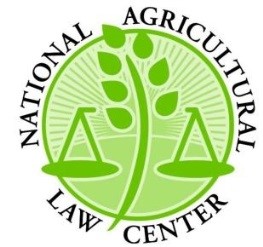A comprehensive summary of today’s judicial, legislative, and regulatory developments in agriculture and food. Email important additions HERE.
JUDICIAL: Includes patents, environmental, finance and credit, and Urb & Ag issues.
In TC HEARTLAND LLC v. KRAFT FOODS GROUP BRANDS LLC, No. 16–341 (U.S. May 22, 2017), an Indiana-based food sweetener company was sued by Kraft Foods in Delaware and lower courts refused to transfer the case to Indiana. Plaintiff argued Kraft’s patent-infringement suit should not take place in Kraft’s chosen district in Delaware, but moved to Indiana, where it is incorporated. In a unanimous decision, the Supreme Court ruled patent infringement cases can only be heard in a court either where the defendant is headquartered or where infringement has occurred and the defendant has a “regular and established place of business.” The Supreme Court reversed the Federal Circuit and held the word “resides” in the patent venue statute “refers only to the State of incorporation” of the alleged infringer. A copy of the opinion is available here.
Robert and Colleen BARTLETT; Wlliam and Michelle Barrington, III; Kim Calverase; Daniel and Veruska Dantuono; David and Juliette Dedo; Timothy and Sally Delany; Brian and Tracy Dellow; Ron Gryzlec; Brenda Carpenter; Douglas and Charlene Hart; Thomas and Kimberly Kshyna; Matthew and Tracy Licameli; John and Kathleen Marinelli; William and Stephanie Mathewson; Peter and Jenafer Medina; Bryan Mignone; Elaine Everitt; Brian and Kimberly Murphy; Scott and Jill Musemeci; Jerry and Kristina Parzych; Jonathan and Margaret Patch; Timothy and Sharon Pieper; Frederick and Heather Puchta; Lynore and Mark De La Rosa; Robert and Lori Smith; Joey St. Louis; Robert and Megan Vertucci; Michael and Lynda Wade; David Corrente; Gary Corrente; Lucy Corrente; Sarah Martinelli; Deborah Ross, individually and as the representative of the Estate of Edward Wilbur; Thomas and Kimberly Gdula; Michael and Alpha Kshyna; and McKenzie Yost, Plaintiffs, v. HONEYWELL INTERNATIONAL, INC., Defendant, 5:13-CV-365, 2017 WL 2223025 (N.D.N.Y. May 19, 2017) involved a dispute regarding cleanup operations at a Superfund Site. Plaintiffs argued defendant “failed to employ reasonable care under the circumstances in implementing and in choosing the various methods for remediation at the Site.” Defendant argued that the Comprehensive Environmental Response, Compensation, and Liability Act (CERCLA) “explicitly prohibits it from undertaking any remedial actions other than those that the Consent Decree authorize[d].” Court reasoned that “state-law claims that create an actual conflict with CERCLA are preempted,” and “consent decrees entered into pursuant to CERCLA . . . qualify as federal law that can conflict with state law.” Court ruled plaintiffs’ claims conflict with CERCLA and granted defendant’s motion to dismiss.
In SUSAN C. SIMON, et al. Plaintiffs-Appellees v. JAY A. UNDERWOOD, et al. Defendants-Appellants, NO. 2016-CA-18, 2017 WL 2223055 (Ohio Ct. App. May 19, 2017), a pair of brothers appealed a commission’s report finding that property devised by their father’s will to them and their sisters “cannot be equitably partitioned between the four siblings.” Court noted that “although the property is a ‘highly productive parcel of farmland,’ partitioning it into four distinct portions could make modern farming methods more difficult.” Court concluded commission provided “sufficient factual analysis to allow the trial court to make an independent determination regarding equitable partition.” Trial court ruling affirmed.
In CAMDEN COUNTY, EAST CAROLINA BEHAVIORAL HEALTH, and PASQUOTANK COUNTY, Plaintiffs, v. NORTHEASTERN COMMUNITY DEVELOPMENT CORPORATION, UNITED STATES DEPARTMENT OF AGRICULTURE, and UNITED STATES INTERNAL REVENUE SERVICE, Defendants, No. 2:15-CV-21-D, 2017 WL 2219090 (E.D.N.C. May 17, 2017), plaintiffs sought to quiet title against the USDA and other defendants. With loans from the USDA, defendant NCDC constructed a child care facility on a piece of property. After NCDC stopped operating the facility, the sellers (plaintiffs) claimed they owned the property because of the deed’s reversion clause. Court ruled that “the Sellers own the Property in fee simple absolute, unencumbered by the USDA’s lien, by operation of the possibility of reverter,” and denied defendants’ motion for summary judgment.
REGULATORY: Includes USDA, EPA, FWS, and NOAA rules and notices.
DEPARTMENT OF AGRICULTURE: Notice USDA has submitted information collection requirement(s) to OMB for review. Title: Importation of Horses, Ruminants, Swine, and Dogs; Inspection and Treatment for Screwworm. Details here.
ENVIRONMENTAL PROTECTION AGENCY: Rule EPA is taking direct final action on a revision to the formaldehyde emission standards for composite wood products final rule. Info here.
FISH AND WILDLIFE SERVICE: Rule that in Title 50 of the Code of Federal Regulations, Part 17, § 17.95(c) to (e), the critical habitats for the Razorback Sucker and the Santa Ana Sucker are reinstated. Details here.
NATIONAL OCEANIC AND ATMOSPHERIC ADMINISTRATION:
Rule the Omnibus Electronic Vessel Trip Report Framework proposes management measures to increase the timeliness, accuracy, and quality of fisheries data submitted to NMFS while also reducing the burden on the charter and party fishing fleets. Info here.
Notice the Assistant Regional Administrator for Sustainable Fisheries, Greater Atlantic Region, NMFS, has made a preliminary determination that an Exempted Fishing Permit application contains all of the required information and warrants further consideration. Details here.
Notice the New England Fishery Management Council is scheduling a public meeting of its Recreational Advisory Panel to consider actions affecting New England fisheries in the exclusive economic zone. Info here.
Notice the New England Fishery Management Council is scheduling a public meeting of its Groundfish Committee to consider actions affecting New England fisheries in the exclusive economic zone. Info here.
